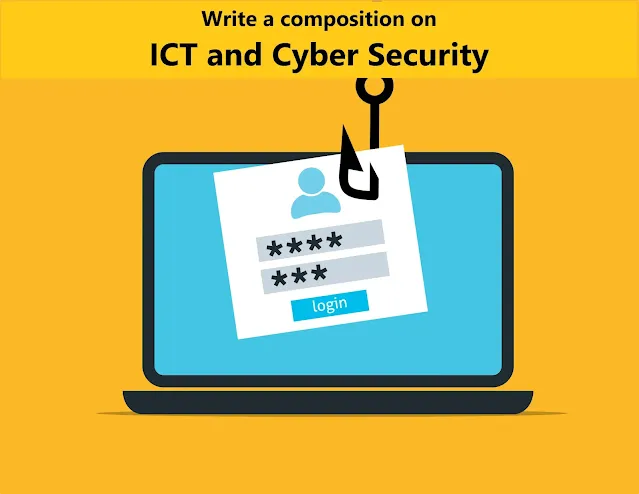Write a composition on ICT and Cyber Security
ICT and Cyber Security
Information and Communication Technology (ICT) has become an integral part of our daily lives. From communication and entertainment to education and commerce, ICT has transformed the way we live and work. With the increasing reliance on technology, it is crucial to ensure that our systems and data are secure and protected from cyber threats.
Cybersecurity refers to the measures taken to protect internet-connected systems, including hardware, software, and data, from attack, damage, or unauthorized access. It involves protecting computers, servers, mobile devices, electronic systems, and networks from cyber-attacks and other threats.
There are various types of cyber threats, including viruses, malware, ransomware, phishing attacks, and denial of service (DoS) attacks. These threats can result in significant damage, such as the loss of sensitive data, financial loss, and reputational damage. Cybersecurity is essential to protect against these threats and to maintain the confidentiality, integrity, and availability of information and systems.
The importance of cybersecurity is highlighted by the increasing number of cyber-attacks in recent years. According to a report by Cybersecurity Ventures, the cost of cybercrime is expected to reach $6 trillion annually by 2021, up from $3 trillion in 2015. In addition, the number of data breaches and cyber-attacks has been steadily increasing over the years, with the number of recorded data breaches increasing by 11% in 2020 compared to the previous year.
One of the primary challenges in cybersecurity is the constantly evolving nature of cyber threats. As technology and the internet continue to advance, new vulnerabilities and attack vectors are constantly being discovered. This makes it challenging for organizations to keep up with the latest threats and to protect their systems and data.
To address this challenge, organizations need to adopt a proactive approach to cybersecurity. This includes implementing robust security measures such as firewalls, antivirus software, and encryption, as well as regularly updating and patching systems and software. It is also essential for organizations to educate their employees on cybersecurity best practices, such as creating strong passwords and being cautious of phishing attacks.
Another significant challenge in cybersecurity is the shortage of skilled professionals. According to a report by (ISC)², there is a global shortage of cybersecurity professionals, with the demand for these skills expected to grow to 6 million by 2019. This shortage can make it difficult for organizations to effectively protect their systems and data and can also lead to higher salaries for skilled professionals.
To address the shortage of skilled professionals, it is essential for organizations to invest in employee training and development and to encourage the growth of the cybersecurity industry. This can include offering internships and mentorship programs and supporting the development of cybersecurity curricula in educational institutions.
In conclusion, ICT and cybersecurity are critical to the functioning of our society. As the reliance on technology and the internet continues to grow, it is essential to ensure that systems and data are protected from cyber threats. This requires a proactive approach to cybersecurity, including implementing robust security measures, regularly updating and patching systems, and educating employees on best practices. It is also crucial to address the shortage of skilled cybersecurity professionals by investing in employee training and development and supporting the growth of the cybersecurity industry.




